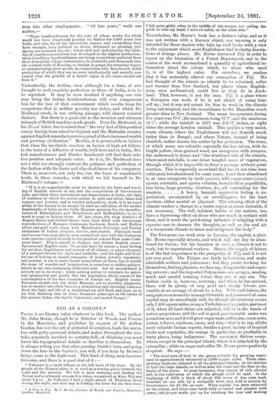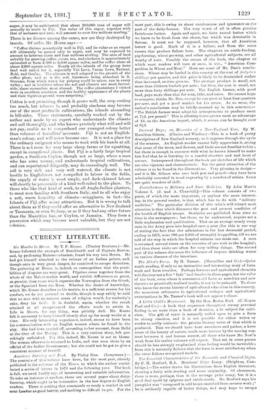FIJI AS A COLONY.*
THERE is no literary value whatever in this book. The author, Mr. John Horne, though he is Director of Woods and Forests in the Mauritius, and publishes by request of Sir Arthur
Gordon, has not the art of pictorial description, loads his narra- tive with petty personal details, and makes throughout the mis- take, popularly ascribed to country-folk, of thinking you must know the topographical details so familiar to themselves. He is always telling you that after passing Smith's barn, and going down the lane to the Squire's, you will, if you keep by Brown's hedge, come to the high. road. This kind of thing soon becomes tiresome, and there is a good deal of it :—
" Nukusari is a small village on the left bank of the river. By the people of the Namosi tribe, it is used as a resting-place between the coast and the interior. We left it next morning, and fording the Navua and a tributary stream five times, we arrived at Koro Wai-wai about 4 p.m. At Nukusari I bad a slight attack of Mauritius fever during the night, and next day in fording the river for the first time, • A Pear in Fiji. By J. Horne, Director of Woods and Forests, Mauritius. London ; Stanford. I felt quite giddy when in the middle of the stream, bat calling the guide to take my hand, I arrived safely on the other side."
Nevertheless, Mr. Home's book has a distinct value, and as it was not written with a literary object, our warning is only intended for those readers who take up such books with a view to the enjoyment which most Englishmen find in chatty descrip- tions of strange places. Mr. Horne traversed Fiji in order to report on the formation of a Forest Department, and in the course of his work accumulated a quantity of agricultural in- formation about the colony which, to those who need it, is of the highest value. For ourselves, we confess that it has materially altered our conception of Fiji. We had thought of the islands as islands to be colonised, softer and warmer than New Zealand, but places where English- men, once acclimatised, could live as they do in .Auck- land. That, however, is not the case. Fiji is a place where a European can work, if he is not afraid of using him-
self up ; but it was not meant for him to work in, the climate being sub-tropical, and the resemblance to the Mauritius much greater than to New Zealand. The mean temperature during five years was 79.1°, the maximum being 971°, and the minimum 58 5°; while the rainfall in 1877 was 251-57 inches, or eight times the average London rainfall. This implies a very moist,
warm climate, where the Englishman will not flourish much better than in Bengal; and where Nature, instead of being churlish, rather daunts the settler by her profusion. The trees, of which many are valuable, especially the kau tabua, with its bright yellow, close-grained wood, are overgrown with creepers, the underwood is dense, and "the windward side of the islands, where most rain falls, is one dense tangled mass of vegetation,.
through which it is impossible to force a passage without great exertion. This is especially so on land that has at one time been
cultivated, but abandoned for some years. Land thus abandoned is at once overgrown by reeds (gasau), wild sugar-canes (vicosly sponia orientalis, and sponia velutina, homalanthus populifolia,
tree ferns, large-growing climbers, 8:c., all contending for the mastery A heavy, languid, oppressive feeling is ex- perienced, accompanied by an unwillingness for the least exertion, either mental or physical. The relaxing effect of the- climate renders a change to a cooler region at times desirable, if not necessary. The dull, indolent habits of the natives, too,. have a depressing effect on those who are much in contact with them, and it needs the quickening influence of mingling with a superior race to sharpen the thoughts, as well as the cool air of a temperate climate to brace and invigorate the body."
The European can work even in Leval:a, the capital, a place Mr. Home especially detests, and which will one day be aban-
doned for Savua ; but his function in such a climate is not to work, but to superintend workers. Hence, the supply of labour is of the last importance to the prosperity of Fiji, and it is not yet very good. The Fijians are fairly industrious, and make admirable soldiers and policemen ; but they prefer working for themselves, finding planters, we dare say, disagreeable and exact- ing persons ; and the imported Polynesians are savages, needing much and careful training before they are of any use. The Indian coolie is, however, arriving ; and when he has arrived, there will be plenty of very good and steady labour, pro- curable at an average of about Is. a day. With such labour, the emigrant accustomed to manage Orientals and passessed of some capital may do exceedingly well, for though the territory covers only 7,400 square miles, or say a Yorkshire and a quarter, and most of it, when all land-claims are adjusted, will be in the hands of native proprietors, still the soil is good, purchaseable under two pounds an acre, and it will grow sugar-cane, coffee, tea, cocoa-nuts, cotton, tobacco, cinchona, cacao, and rice,—that is to say, all the most valuable Indian exports, besides a great variety of tropical fruits and vegetables, the orange in particular, so profitable in. many places, being indigenous. The cocoa-nut thrives every- where, except in the principal island, where it is attacked by the caterpillar ; while on sugar and coffee Mr. Horne grows positively eloquent, die says :—
"The total area of land in the group suitable for growing sug-ar. cane is approximately estimated at 1,000 square miles. These cane- growing lands are situated in all the principal islands ; in the interior of both the large islands, as well as near the coast and the flats on the banks of the rivers. In most instances, they consist of rich alluvial soil, in the cultivation of which the plough could be used. In the beginning of 1878, a block of abcut 650 acres of fine cane land', bounded on one side by a navigable river, was sold at auction by Government, for 21 10s. an acre. When capital has been attracted to the colony, and these cane lands fully occupied and planted with canes, and proper works put up for crashing the cane and making
sugar, it may be anticipated that about 200,000 tons of sugar will annually be made in Fiji. The value of this sugar, together with that of molasses and rum, will amount to over five millions sterling."
There is no*disease among the canes, nor are they destroyed by insects. Of coffee Mr. Horne says:— " Coffee thrives remarkably well in Fiji, and its value as an export will ultimately be second only to sugar, and may be expected to amount to between three and four millions sterling. The area of land suitably for growing coffee, cocoa, tea, and cinchona is approximately estimated at from 2,500 to 3,000 square miles, and for coffee alone at about 2,000 square miles. Nearly all the islands of the group have land well suited for it, especially Viti Levu, Vanua Levu, Taviuni, Rabi, and Ovalau. The climate is well adapted to the growth of the ,coffee plant, and so is the soil, limestone being abundant in it. Streams, from which water for pulping could be taken, run in every valley ; and in localities where the soil and climate are most favour- able, these streamlets most abound. The coffee plantations I visited were in excellent condition, and the healthy appearance of the plants and their vigorous growth were surprising."
Cotton is not promising, though it grows well, the crop costing too much, but tobacco is, and probably cinchona may become one of the most profitable cultivations, the islands abounding in hill-sides. These statements, carefully worked out by the author and made by an expert who understands the climate and soil thoroughly, and who knows precisely what will and will not pay, enable us to comprehend our youngest colony better than volumes of travellers' accounts. Fiji is not an English- man's colony, and will never become one. It is not a place for the ordinary emigrant who means to work with his bands at all. There is nct room for very large sheep farms or for squatting, except in exceptional places. But Fiji is a fairly large tropical garden, a Southern Ceylon, though not so large, where a man who has some money, and understands tropical cultivations, and can superintend diligently, may do exceedingly well. The soil is very rich anti very well watered, the climate is not hostile to Englishmen not compelled to labour in the fields, the supply of water is most ample, and dark-skinned labour will shortly be procurable of a kind well suited to the place. To those who like that kind of work, to all Anglo-Indian planters, to most men familiar with Southern Italy, and to all who enjoy a soft, warm humidity of climate—mugginess, in fact—the
Islands of Fiji offer many attractions. But it is wrong to talk about them as if they could offer an alternative to New Zealand or Tasmania, or even Sydney, or as if they had any other future than the Mauritius has, or Ceylon, or Jamaica. They form a possession which may become most valuable, but they are not colonies.































 Previous page
Previous page